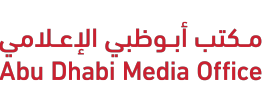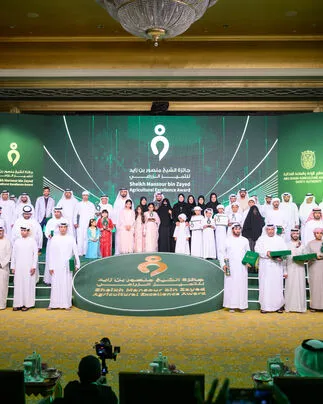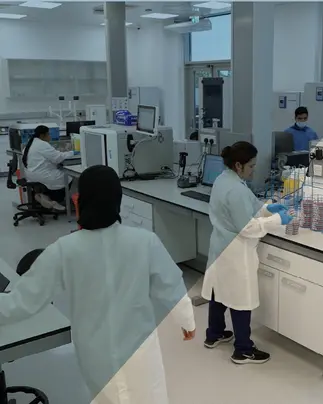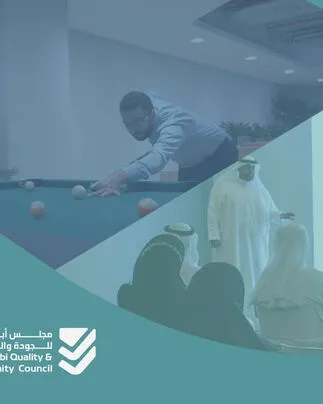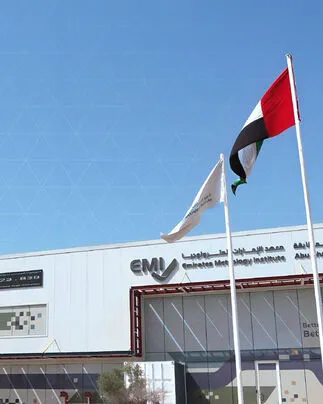Since its establishment in 2009, the Abu Dhabi Quality and Conformity Council (QCC) has been playing a leading and contributory role in implementing the vision of Abu Dhabi Government and its leadership for over a decade, a senior official of the Council said.
Eng. Abdullah Ahmed Abdullah Al Yazidi, Executive Director of the Strategic Affairs Sector of QCC said that the Council has been instrumental in developing quality infrastructure and supporting sustainable economic development in Abu Dhabi and focuses on the growth of the non-oil sector by attracting more investments and enhancing the Emirate’s competitiveness.
“It is our commitment and duty to ensure that our young country moves to the next stage of development and progress as we enter the fiftieth anniversary year. Towards this, we need to prepare and develop a strategic vision that can be implemented through a set of practical plans and promising projects, pursue a culture of innovation armed with up-to-date knowledge and a scientific approach, that befits the needs and reputation of Abu Dhabi,” said Eng. Al Yazidi.
The strategic goals of QCC, benchmarked to the progress and advancement made by many developed countries in the world in quality infrastructure, have helped raise safety and quality of products available in the market safeguarding consumer rights, protecting environment, and supporting national industry to be competitive, he said.
Eng. Al Yazidi said that QCC continues to keenly work for the achievement of strategic growth goals of various economic and social sectors in Abu Dhabi by pursuing a systematic approach to raise quality standards and employee efficiency by collaborating and communicating with relevant authorities as well as by empowering its partners.
“In its first decade of operations, QCC developed various services including prudent and unique measurement systems and laboratory and calibration services that catered to the national industry requirements. The calibration and verification services of QCC are acclaimed for its highest measurement accuracy at the national level. In 2014, QCC also signed a cooperation agreement with the Ministry of Industry and Advanced Technology, which accorded the status of national reference entity for measurements to the Emirates Metrology Institute as well as the right to represent the UAE at the International Bureau of Weights and Measures,” he said.
QCC have also been able to unify and consolidate inspection and testing services of government laboratories under one umbrella – the Central Testing Laboratory, which helped raise the efficiency of verification and testing services. The laboratory offers testing services including radiation and environment checks, in the emirate for food and beverages, water, building materials, pharmaceuticals, medical devices, cosmetics and agriculture, comprising 473 main tests and over 3,250 sub-testing services through its main office in Abu Dhabi, Al Ain branch and the construction laboratory in Abu Dhabi. Joining hands with private partners, the laboratory have also created an authorization system for lab efficiency. This has helped the Council to make optimal use of its inspection capabilities, support the private sector, and provide over 97% of services required by the Abu Dhabi government agencies in sectors such as building and construction materials. In addition, this has also enabled the Council to introduce new services such as merit programmes in 2014 supporting a laboratory accreditation system in the country, with 94 programmes currently active.
Harmonization of specifications
Al Yazidi said the Council has also been able to unify and harmonize technical specifications and standards of various government agencies and there are now 253 standardization documents. The most prominent among them are the harmonized guideline for the services infrastructure specifications for Abu Dhabi, and the issuance of 58 matching programs for individual services, and 39 product matching programs.
The Council also signed an authorization agreement with the Ministry of Industry and Advanced Technology for verifying legal measurement tools to ensure that the readings of these devices were accurate. These devices and measurement tools span petroleum meters, commercial scales used in retail outlets, ground ballasts used for weighing trucks and large tanks, apart from medical thermometers, medical blood pressure monitors, pre-packaged goods etc.
He also said that under its terms of establishment, the Council checks and controls restricted products across household electrical appliances, children's toys, car tires, and other products. As a result, the Council was able to raise the level of safety and quality of these products available in the market and achieve better protection for consumers, the national industry and the environment.
Specification and Conformity Services
Eng. Al Yazidi said the Council’s strategic objective in the Specifications and Conformity Services Sector, is to support the development of quality infrastructure services through standardization and calibration, harmonization of technical documents as well as by rolling out conformity programme services. This in turn has helped enhance the quality and competitiveness of goods and services provided in Abu Dhabi.
“QCC’s focused conformity programmes in the last decade helped develop and raise workers’ efficiency across verticals, and supporting our partners reduce damages that could occur from employing untrained workers. These programmes also reflected positively on the national economy since it helped nurture skilled labor benchmarked to global standards,” he said, adding that many programmes and services of the Council have also led to rationalizing energy consumption, reducing environmental damage, and ensuring a healthy economic climate for growth across all sectors.
The Council’s norms of standardization have been put in place with conditions and requirements for products, processes, and services, to achieve optimal degree of quality. These span specifications in the case of food, construction materials, chemicals, electrical equipment and the environment, among others. The norms also led to removing obstacles to trade while facilitating technical cooperation between the relevant authorities.
The Council’s guidelines include Abu Dhabi Technical Standards, Abu Dhabi Guidelines, Abu Dhabi Professional Requirements, and Abu Dhabi Technical Reports, in addition to a mandatory guideline for the service infrastructure specifications in Abu Dhabi, leading to harmonization of various rules of government entities, introduction of product matching and individual services programmes. This also included procedures to obtain the Trust Mark or Certificate of Conformity and how to maintain it, Eng. Al Yazidi said.
Market and Consumer Services
The Council’s Market and Consumer Services Sector achieved remarkable milestones and tangible results across inspections and market control activities, verification of measurement tools and pre-packaged products, apart from ensuring conformity of products and recalling those non-conforming from the market. These activities helped safeguard consumer rights, fairness in the market, while also improving quality, he said.
The Market and Consumer Services Sector ensured achieving the strategic objective of QCC to be a gatekeeper for product safety and market fairness in Abu Dhabi. It also maintained follow ups on product quality as well as in granting Trust Mark ensuring compliance norms stipulated in the conformity programmes. It also supported the Ministry of Industry and Advanced Technology in line with product categorizations like the restricted and those with a Certificate of Conformity, and other verification services specified in the legislation issued by the Council of Ministers as well as the ministry.
Eng. Al Yazidi said that since its launch in 2011, the Market and Consumer Services Sector has sought to develop, improve and sustain its services through methodologies that ensured optimal use of resources, in turn enhancing efficiency and empowering employees through training. Through efficient planning, implementation, follow-up and measurement of its services, the Market and Consumer Services Sector also contributed to developing local industries and enhancing their competitiveness while also protecting consumer rights.
The sector achieved its goals in the last decade to the full, including in 2020, despite the COVID-19 pandemic situation. It succeeded in conducting 10,779 metrological verifications of various legal measurement tools, including high and low-accuracy commercial scales, scales at petroleum product outlets in service stations, ground gauges and tire pressure measurement tools. It verified 3,481 pre-packaged products, in addition to conducting 71,484 conformity inspections, as well as labeling restricted products across household electrical appliances, toys, tires for small and large vehicles, household cleaners, food contact materials, tobacco products and cigarettes.
Eng. Al Yazidi said new innovative procedures such as remote safety inspection of products were also introduced such as verification of goods sold on online marketplaces, since purchasing online has become a major option for many consumers in the context of COVID -19 and social distancing rules. The sector’s inspections focused on ensuring that the products on online platforms complied with the relevant technical specifications and to recall those that are non-conforming.
Central Testing Laboratory
Eng. Al Yazidi said QCC’s Central Testing Laboratory continues to excel in its services to maintain quality of products offered in the markets as well as of materials and devices used across work verticals. The laboratory rolls out technical consultations, technical training programs and provides accreditation certificates for both private and public business partners, consolidating the aim of the Council to be a regional leader in inspection and conformity assessment services.
"These inspection services verify the safety, quality and conformity of any product with the mandated norms in each respective category of products. Processes and personnel services stipulated in the conformity programmes are proven through certification bodies for both products and services of individuals," he said.
He said that with the aim of making the Central Testing Laboratory a reputed regional testing and conformity assessment services entity, the Council has a gamut of testing services, including radiation and environmental testing, for food and beverages, water, building and construction materials, medicines and medical devices, cosmetics, and agriculture products.
Since 2014, the laboratory has carried out over 4.5 million tests, while it has also expanded its capabilities across multiple fields, due to which the efficiency and accuracy levels of its results have increased many folds. It is a registered entity with the Food and Agriculture Organization (FAO) of the UN. The laboratory is also a member of the Global Soil Laboratory Network (GLOSOLAN).
The Central Testing Laboratory is also recognized by the Indonesian Ministry of Agriculture for analysis and issuance of conformity certificates post conducting tests on fresh foods of plant origin exported to the UAE from Indonesia since 2017. The laboratory was also chosen to be the official reference body of the UAE for Barakah Nuclear Power Plant for radiation tests.
Emirates Metrology Institute
The Emirates Metrology Institute has been providing services to private and public sector business partners to implement best-in-class standards of calibration and quality, Eng. Al Yazidi said, adding that these services have helped upgrade the quality infrastructure and raising national and global competitiveness of Abu Dhabi’s markets and industries. The institute is also a regional leader in metrology.
"The institute’s services have helped develop an efficient metrology infrastructure and create a reputation for itself in the global measurement science fraternity with its capability in all types of measurements across sectors in global and national standards of scales.
The institute represents the UAE at the International Committee for Weights and Measures, CIPM-MRA, the regional and international technical committees of the Asia Pacific Metrology Association, the Joint Committee of Regional Groupings and the Gulf Metrology Association, among others.
Eng. Al Yazidi highlighted that the institute is a pioneering national project at a regional leadership level, and its establishment has a direct and positive impact on various vital economic sectors of the country, including the industrial sector. The institute has helped reduce the cost and output time facilitating global acceptance for Emirati national industries while supporting production capacity upgrades.
The institute’s scope of services and role has grown from national to regional level now, helping achieve an efficient national and Gulf-wide metrological system.
The institute is accredited by the Emirates International Accreditation Centre (EIAC) in line with ISO 17025 for most of the calibration services it provides to its clients. Thanks to the institute, the UAE has become the first country in the Gulf region to publish measurement and calibration capabilities on the International Bureau of Weights and Measures database, which is an initial step to facilitate international acceptance of national industries.
